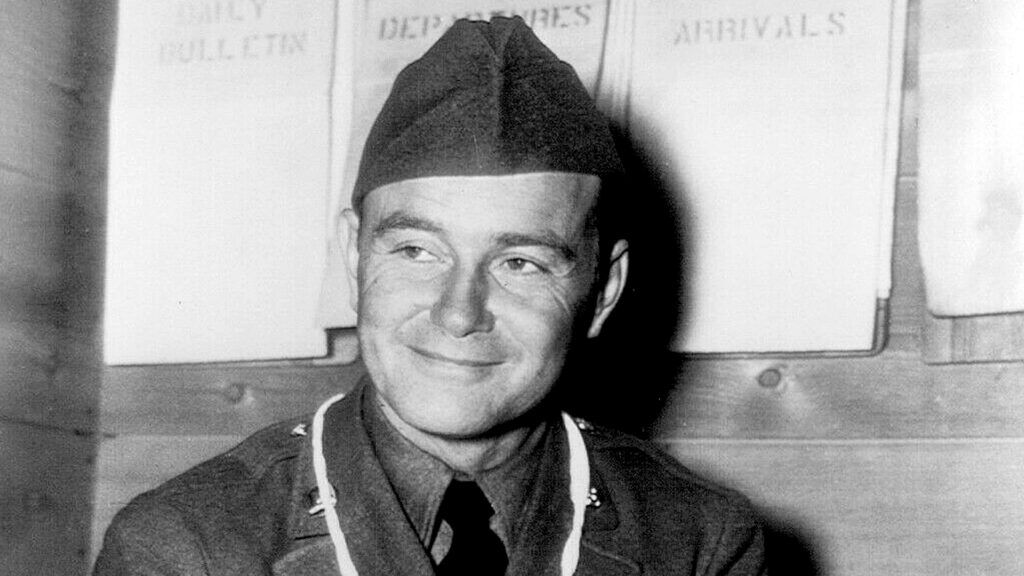I was on an editorial trip to the West Coast recently when someone mentioned a new ABC-TV series coming up in the fall. It was called Lime Street and it was to star Robert Wagner and Lew Ayres.
Lew Ayres? The name started me musing. I hadn’t thought of him for a long time, but I remembered with a kick what a fan I’d been when he played the young doctor in all those “Dr. Kildare” films back in the ‘30s.
And who of my generation could ever forget the 1930 movie All Quiet on the Western Front, that eloquent sermon against war?
To this day I can see its stunning closing scene: the last day of fighting in World War I…the young German soldier, Lew Ayres, disillusioned with war, crouches in a rain-soaked battie trench…a butterfly flutters overhead and alights in the mud…the soldier, entranced, crawls out of the trench…he reaches for the butterfly…the camera focuses on his hand as his fingers almost touch it…a sniper’s rifle cracks…the hand convulses and folds in death.
The message of that film would be right in tune with today’s parades for peace and anti-nuclear-war demonstrations. It made me think of the personal stand that Lew Ayres took in the early days of World War II. And the flak he suffered for it. There was a lot of talk about his being a coward, a “slacker.” What actually happened to him? How had it all worked out?
The next day our West Coast editor managed to arrange an interview with the actor at his home, and I scurried off to do some research beforehand. I drove over to the Academy of Motion Picture Arts and Sciences housed in Beverly Hills.
Besides being the home of the famed annual “Oscar” awards committee, the Academy has an extensive library offering not only historic memorabilia but voluminous news clippings and books and films about Hollywood and its industry.
In the Academy’s reading room I delved into a satchelful of newspaper and magazine articles on Lew Ayres, so I knew a lot more about him when the next afternoon found the two of us sitting in his sun-dappled living room.
After all these years, I hadn’t expected the 76-year-old man to look like the actor of my memory, yet there was the same finely chiseled face, the same intelligent eyes and that same feeling of bedside compassion that my young Dr. Kildare had exuded. The conversation flowed easily. We talked about his role in All Quiet and how it had affected his attitude toward war.
He smiled as he spoke about the decision he made in 1942 shortly after World War II began. “I’ll always remember that form the government sent me. It had two squares: the first to mark if I would accept military combat, the second if I had objections.” Ayres marked the second square.
“I wanted to save lives, not take them,” he explained.
Even though his decision was based on years of prayer and reflection, he said that marking that second square was like “picking up the biggest rock I ever found and throwing it through a window.”
And there had been a lot of shattered glass. One major theater chain banned his films. One columnist called him “the most mentally confused actor of the year.” “The Kildare series is dead,” wrote a St. Louis reporter, “and so is the career of Kildare Ayres.”
If Ayres had marked the first square instead of the second, he could easily have landed a cushy military post, entertaining the troops or making training films. But Ayres was not looking for a soft berth; his goal was to become a medic in the front lines—and that became a battle in itself.
The government sent him to a camp in the mountains where he cut trees and constructed firebreaks. Eventually, however, Ayres won induction into the Army as a private in the medical corps, where he began teaching first-aid classes and prepared for the overseas duty that was to take him into some of the hottest spots in the South Pacific. He was in three beachhead invasions—Hollandia, Leyte and Luzon.
Ayres laughed when he mentioned Leyte. He was remembering how being a Hollywood actor sometimes had its advantages. “We were in the landing craft heading for the beach,” Ayres said. The tension had brought the men to a nervous silence until Lew announced, “Frankly, I always had a double for this sort of thing.”
The spell was broken. The men roared in laughter.
In the two years he saw service overseas, Ayres worked often under enemy fire. I had read that on New Guinea a bomb struck an ammunition dump near a field hospital. Wounded men lay helpless in their hospital beds, but as the violence continued, Ayres walked from tent to tent, talking with the men, soothing them, joking with them.
“There is a strange atmosphere at the front that you don’t experience any-where else,” Ayres told me. “No longer are you in a competitive society with all its rivalry. Instead, there is a feeling of brotherhood. You find yourself quelling irritations and disagreements.
“I learned more about human nature at the front than anywhere else,” he added. “Before the war I was never great for mixing with people. I thought I could find my answers in books. But fellowship among soldiers, with each man sharing his part of a common burden, is a wonderful thing to experience. Imagine what could be accomplished with such a singleness of purpose in the civilian world.”
As the need for combat medics lessened, Ayres volunteered as a chaplain’s assistant, relinquishing staff-sergeant stripes to become a PFC. Before the war he had seriously considered entering the ministry. Now he helped the wounded write letters, ran films for the troops—and delivered sermons in the chapel.
After the war Lew Ayres returned to Hollywood where, contrary to earlier expectations, film studios competed in signing him.
“What about all those people who had criticized you?” I asked.
He smiled and slowly shook his head. “I couldn’t get angry at a single one,” he said. “Each had his own point of view and I could see it.”
In addition to films, Lew continued his quest for understanding among people. At his own expense he produced and distributed a feature-length film Altars of the World, examining the variety of man’s religions and emphasizing our brotherhood under God. He also made a number of Bible-story recordings, with large casts and orchestral background music, which he distributed to churches.
As the interview drew to a close, the sun was sinking behind the California hills outside.
“You certainly can be proud of your accomplishments,” I said.
“Not really,” he mused. “But, at least I’ve learned what to pray for.”
“What’s that?”
“For God’s presence in my life. That, I believe, is the only reality that sustains us.
“It’s like a long rope,” he added quietly.
“A rope?”
“Yes.” he said, looking into the sun. “Our relationship with God is like a long rope between Him and us, a rope that needs a firm grip on both ends. God is certainly holding on to His end. What counts is how tightly we hold on to ours.
“If we allow emotions like hate to come between God and us, then our own grip on the rope is weakened. But so long as we hold firm, there is practically nothing that we can’t accomplish.”
Outside, the mountaintops were now silhouetted in glorious colors.
I looked at the man sitting across from me. Here was the soldier from All Quiet on the Western Front. Here was the Army medic from World War II. Here was a man who was at peace with himself. He had held firm.
For more inspiring stories, subscribe to Guideposts magazine.





